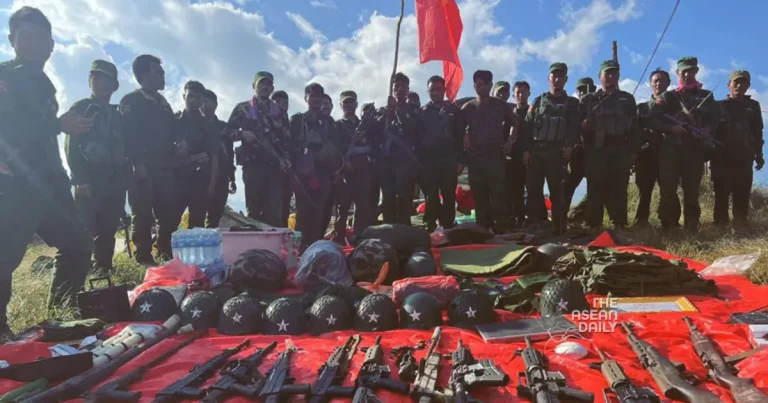9-11-2023 (BANGKOK) Myanmar’s military leader has alleged that a major offensive in the country’s north-east, conducted by an alliance of armed ethnic minority organizations, was partly funded by profits generated from the region’s drug trade, according to state-controlled media reports on Thursday, November 9.
Senior General Min Aung Hlaing made this accusation after the military government faced unexpected and intense fighting in several towns in the country’s north-eastern border area.
On October 27, the Arakan Army, the Myanmar National Democratic Alliance Army, and the Ta’ang National Liberation Army, collectively known as the Three Brotherhood Alliance, launched a coordinated offensive in northern Shan state.
The military has admitted to losing control of three towns in northern Shan state, including a significant border crossing point for trade with China. However, they have not explained why they were unable to mount an effective defense.
Min Aung Hlaing stated at a meeting of the state National Defence and Security Council that “Today’s problem in Shan state (North) was triggered by narcotic drug problems. Earnings from narcotic drugs were spent on seizing power through the armed struggle. Such a plan was covered by drug production and trafficking.”
The group accused of involvement in drug trafficking, the Myanmar National Democratic Alliance Army, has denied these allegations.
Large-scale drug production and trafficking have long been prevalent in Myanmar’s border regions, involving substances like opium, heroin, and methamphetamine. Various ethnic minority groups have been associated with the drug trade to fund their armed movements, but there have also been allegations of army involvement, especially at the regional level.
Acting President Myint Swe warned at the Defence Council meeting that the country is in a critical condition and could be torn apart if the military does not take effective action against the groups responsible for the attacks.
Min Aung Hlaing had previously mentioned that the military would counterattack those targeting military camps, despite the trust he claimed to have built with ethnic minority groups.
He cited that conflicts in Shan state occurred because the Myanmar National Democratic Alliance Army had used drug profits to strengthen itself and reclaim dominance in the Kokang Special Region.
The MNDAA is the fighting force of Myanmar’s Kokang ethnic minority.
Min Aung Hlaing stated that there have been 18 major drug cases in the Kokang area since 2006, resulting in 140 arrests and the seizure of drugs worth 71.6 billion kyat (US$34 million).
A spokesperson for the MNDAA, Lee Kyar Wai, denied the drug-related accusations, asserting that the group has implemented anti-drug measures and alternative crop farming in the Kokang region since 2007. He explained that the ethnic alliance’s offensive aims to combat the military dictatorship, establish a federal democracy, and address online gambling fraud in Myanmar, particularly along the China-Myanmar border.
Myanmar is already experiencing what some UN experts describe as a civil war due to armed resistance against the military’s seizure of power from Aung San Suu Kyi’s elected government in 2021.
The alliance’s offensive has been seen as supporting the nationwide armed struggle led by the People’s Defence Force, the loosely organized armed force of the National Unity Government, which claims to be Myanmar’s legitimate government. Some ethnic armed groups have aligned themselves with the People’s Defence Force.
The situation is complex, as both the military government and the Three Brotherhood Alliance maintain good relations with China. Both claim to be working to shut down cybercrime scam operations primarily based in Myanmar’s border areas, which China has sought to have closed. These operations are often run by ethnic Chinese entrepreneurs, employ a large number of Chinese individuals, and target Chinese victims.




